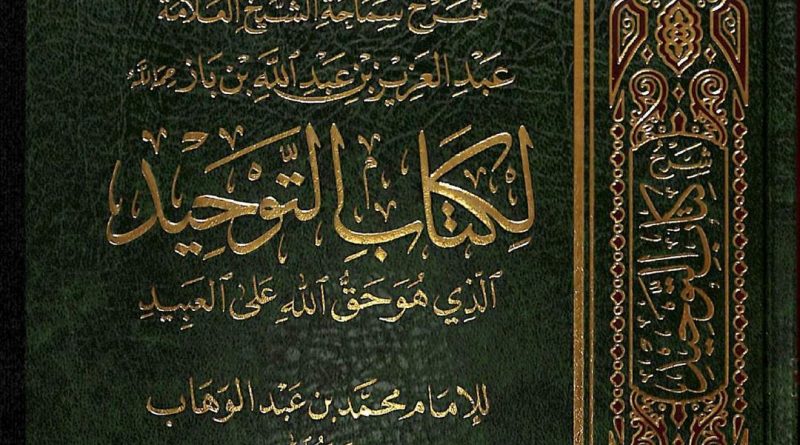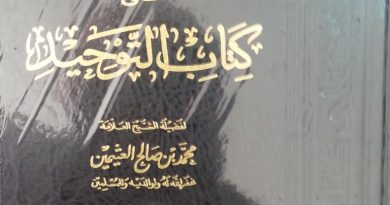Kitaab At Tawheed – Part 7. Chapter 2 : The superiority of Tawheed and the sins it expiates
بسم الله الرحمن الرحيم
Kitaab At Tawheed – Part 7
Chapter 2 – فضل التوحيد وما يكفر من الذنوب
[The superiority of Tawheed and the sins it expiates]
In this chapter, we will learn the virtue of Tawheed and how Tawheed is a reason to expiate the sins.
ٱلَّذِينَ ءَامَنُواْ وَلَمۡ يَلۡبِسُوٓاْ إِيمَـٰنَهُم بِظُلۡمٍ أُوْلَـٰٓٮِٕكَ لَهُمُ ٱلۡأَمۡنُ وَهُم مُّهۡتَدُونَ (٨٢)
It is those who believe (in the Oneness of Allâh and worship none but Him Alone) and confuse not their belief with Zulm (wrong i.e. by worshipping others besides Allâh), for them (only) there is security and they are the guided.
[Surah Al-Anaam : 82]
At this point, Shaykh Muhammad ibn Abdul Wahhab brings this verse 82 of Surah Al-Anaam. If we look at the previous verse, Ibrahim عليه السلام was debating with his people..
وَڪَيۡفَ أَخَافُ مَآ أَشۡرَڪۡتُمۡ وَلَا تَخَافُونَ أَنَّكُمۡ أَشۡرَكۡتُم بِٱللَّهِ مَا لَمۡ يُنَزِّلۡ بِهِۦ عَلَيۡڪُمۡ سُلۡطَـٰنً۬اۚ فَأَىُّ ٱلۡفَرِيقَيۡنِ أَحَقُّ بِٱلۡأَمۡنِۖ إِن كُنتُمۡ تَعۡلَمُونَ (٨١)
And how should I fear those whom you associate in worship with Allâh (though they can neither benefit nor harm), while you fear not that you have joined in worship with Allâh things for which He has not sent down to you any authority. (So) which of the two parties has more right to be in security? If you but know. [Surah Al-Anaam : 81]
In this verse 81 of Surah Al -Anaam, Allah mentions ‘the two parties ٱلۡفَرِيقَيۡنِ’, one of them being Ibrahim عليه السلام and the other being the disbelievers. Ibrahim عليه السلام is telling the other party (the people of Kufr) to think who actually has the right to feel secured (from punishment).
Allah says:
﴿ الَّذِينَ آمَنُوا وَلَمْ يَلْبِسُوا إِيمَانَهُمْ بِظُلْمٍ أُولَئِكَ لَهُمُ الْأَمْنُ وَهُمْ مُهْتَدُونَ ﴾ [الأنعام: 82].
It is those who believe (in the Oneness of Allah and worship none but Him Alone) and confuse not their belief with Zulm (wrong i.e. by worshipping others besides Allah), for them (only) there is security and they are the guided.
The Shaikh mentions that it was Allah سُبْحَانَهُ وَتَعَالَى who replied to Ibrahim’s question when he was debating with his people. Allah judged between them. Ibrahim عليه السلام asked ‘Who has the right to be secure and safe?”. Then Allah replied and said that those deserving of security and guidance were the ones who did not mix their Tawheed and their belief in Allah with shirk.
Which proof can we take from this verse? The proof of the virtue of Tawheed: the people of Tawheed are promised ‘Al Amn’ which means security, safety and guidance. This is one of the many virtues of Tawheed.
We need to understand the meaning of “Dhulm” in this verse, as when the Companions, who were upon Tawheed, heard this verse 82 of Surah Al-Anaam they became worried as they thought Ad Dhulm الظلم meant sins. This is because, as we mentioned earlier, scholars say that each and every sin is a sort of shirk (i.e. you prefer your desires over obeying Allah) therefore committing a sin is considered Dhulm (injustice) to yourself (e.g. saying bad words). The companions thought they needed to be absolutely free from any sort of Dhulm, including minimal sins, in order to attain this security and safety and guidance that Allah mentions in the verse.
So the Prophet صلى الله عليه وسلم told them ‘No! this is not the Dhulm (the injustice) you think it is, didn’t you hear the wise man Luqman al Hakeem عليه السلام when he advised his son saying:
إِنَّ ٱلشِّرۡكَ لَظُلۡمٌ عَظِيمٌ۬ (١٣)
Verily! Joining others in worship with Allâh is a great Zûlm (wrong) indeed. [Surah Al Luqman – 13]
Therefore, according to this verse of Surah Luqman, Ad Dhulm means Shirk Akbar (Major Shirk). Anyone who is upon Tawheed and does not mix his Tawheed with Shirk Akbar, the greater shirk, then he is promised the main fundamental security which is safety from an eternal abode in the hellfire.
It is extremely important to understand this point because many people think, ‘Since I do not prostrate to an idol and I do not associate anything with Allah then I have full security and I will go to paradise directly regardless of any sins I might commit.’ We say, No! What is promised is the origin of security and ‘Asl Al Amn’(general main security) which is a part of the security that is promised to each and every person upon Tawheed. This main general security means that the person will be safe from being eternally in the Hell fire although he may be punished for a period of time. However, through this promise he will eventually come out of the Hell fire and live in paradise forever. Therefore, anyone who dies upon Tawheed, even if the person committed major sins such as taking bribes, stealing, lying, committing adultery, being bad to parents or smaller sins, as long as these sins do not reach the level of kufr (disbelief) they will not remain in the hellfire eternally.
In the broad sense, Al Amn means to be safe from being punished in both this life (dunya) and the hereafter, on the Day of Resurrection. The safety in this world means that Allah will preserve us from having doubts in our religion as well as protecting us from any kind of harm and accidents. The more we strengthen our Tawheed, the more Allah will protect our religion and Imaan. He will protect our hearts from any illness and deviation and preserve our bodies, wealth and children. Therefore, the amount of protection we get from Allah depends on the level of our Tawheed.
So the more we fulfil and live upon Tawheed and free ourselves from all types of sins the more we have our share from Al Amn (security).
Does this mean that anyone can live without committing sins? No. But our Tawheed will be preserved as long as we keep repenting quickly from our sins. When we repent to Allah and we fulfill the conditions of Tawbah our Tawheed is complete again. For example, if I lied, or took money which is not mine, but I repented and I gave the money back then my Tawheed is restored again. If I carry on all my life in such a way (sinning and repenting) which type of Amn am I promised? I am promised Paradise and complete safety from Hellfire, and this is perfect and complete security.
Therefore, your security (amn) depends upon how you were able to fulfill Tawheed during your life. You might have partially fulfilled Tawheed by not committing the shirk that invalidates it. However, if you had sins and you died without repenting from them then, you will have only the right to lesser security which means that you might be punished for those sins in the Hellfire. On the other hand, if you freed yourself from any sort of shirk and repented quickly from your sins, then you died upon complete Tawheed and so, you will enter Jannah without reckoning.
However, if your Tawheed is mixed with sins, even with greater ones such as killing, as long as those sins are not Shirk Akbar then you will acquire the original main security since you died upon Tawheed (you didn’t commit any act nullifying your tawheed). Therefore, you will be secured from an eternal punishment in the hell fire. Despite this, Allah might punish you for the sins you didn’t repent but eventually you will come out of the Hellfire and have an eternal life in Jannah.
This is a great virtue of Tawheed. I hope you can comprehend the beauty of this virtue. Tawheed is our way out. It will rescue us from having an eternal life in the Hell fire, even if we were bad Muslims and we disobeyed Allah, our Tawheed will save us.
The person who completes his Tawheed will be guided to Jannah directly and will not touch the Hellfire. However, anyone who mixes his Tawheed with sins and disobedience he may get punished firstly to expiate those sins and then he will enter the Jannah.
Accordingly, anyone who has the fundamental basic Tawheed which means not associating anything with Allah and not committing Shirk Akbar is still upon Islam. Therefore, he is promised the primary security and not the complete security. Conversely, those who complete their Tawheed by freeing themselves from the three types of Dhulm will get complete security.
Question:
What is the ruling regarding a person who died upon tawheed yet he has a sin which he did not repent from e.g. he was watching bad movies or he had any haram dealings ?
Answer: this person has the origin of security but he is under the will of Allah, He might punish him or He might forgive him.
How can our sins be expiated if we died without repenting? Allah purifies us from our sins through three ways:
- The first purification will be through suffering pain in “Sakarat al Maut”, when the angel of death is taking his soul.
- The second purification is the punishment of the grave. This can be a reason for him to be purified and after that he can go to Jannah directly. If his sins were beyond this he would be subjected to other punishments.
- The third purification is on the Day of Resurrection, this standing in the sun waiting for the recompense of Allah is another reason for people to get purified of sins.
- Then we have the Siraat, he may find difficulty crossing the Siraat and this can be another reason to purify the sins, but if there is still sins which are not expiated and Allah did not forgive him, then he will be punished in the hellfire for a due time set by Allah. This is the last stage of purification where he will be taken out of hellfire and guided to an eternal life in jannah.
- This is how the people who died without repenting from their sins might be punished if Allah did not forgive them. This shows us the importance of prompt repentance from any sin we might fall into in order to complete our Tawheed again and attain the complete security from Allah’s punishment.
If you want to enjoy complete safety and security and to be guided to the Jannah without any punishment then, you have to fulfill and accomplish your Tawheed. This means that you free your Tawheed from any major shirk – e.g. thread around your wrist for strength, minor shirk, swearing by the Prophet صلى الله عليه وسلم, or saying “touchwood” and all kinds of sins. It is very important to repent quickly after committing any sin so your Tawheed becomes complete and fulfilled again. If I free myself from these three types of Dhulm, then I am promised complete safety, security and guidance, I’m promised to go to Jannah directly.
Conversely, if I protected my Tawheed from shirk but I was upon sins and disobedience and I did not repent from it then my security will not be complete. e.g. a Muslim woman who died while not wearing a hijab. She would have incomplete security because her Tawheed was decreased due to uncovering herself. Her fate would be under the will of Allah. She may be forgiven or she may be punished for her sin and then have an eternal life in Jannah. Why? Because she died upon Tawheed, upon ‘La ilaha Illa Allah.’
The Shaikh says that this security does not mean that a person upon Tawheed will not be punished, No! He is threatened with punishment for the sins he committed and did not repent from them.
Allah says:
فَمَن يَعۡمَلۡ مِثۡقَالَ ذَرَّةٍ خَيۡرً۬ا يَرَهُ ۥ (٧) وَمَن يَعۡمَلۡ مِثۡقَالَ ذَرَّةٍ۬ شَرًّ۬ا يَرَهُ ۥ (٨)
So whosoever does good equal to the weight of an atom (or a small ant), shall see it. And whosoever does evil equal to the weight of an atom (or a small ant), shall see it. [Surah Az-Zalzalah : 7-8]
Hadith:
وعن أبي سعيد وأبي هريرة رضي الله عنهما عن النبي صلى الله عليه وسلم قال: ”ما يصيب المسلم من نصب ولا وصب ولا هم ولا حزن ولا أذى ولا غم، حتى الشوكة يشاكها إلا كفر الله بها من خطاياه” ((متفق عليه)) . (8).
Abu Sa’id and Abu Hurairah (رضي الله عنه) reported that the Prophet (ﷺ) said:
“Never a believer is stricken with a discomfort, an illness, an anxiety, a grief or mental worry or even the pricking of a thorn but Allah will expiate his sins on account of his patience”.
[Al-Bukhari and Muslim].
Abu Bakr Siddiq رضي الله عنه he asked the Prophet صلى الله عليه وسلم :“Will we be punished and recompensed for each and every bad wrongdoing we do by Allah?” (Notice how the companions used to fear about this issue). So the Prophet صلى الله عليه وسلم said: “May Allah have mercy on you, don’t you get tired, stressed, upset or miserable and sad?” Each and every minute of sickness, sadness, headache, or feeling oppressed, or feeling your chest is squeezed or unhappy, even the slightest of pain, even when you scratch your finger to a piece of wood you feel slight pain, each and every pain expiates our sins and Allah forgives us in each and every minute we feel pain.
This pain could be physical, mental, moral or even heart pain. Whatever the case it may be, Allah will expiate our sins on account of the hardships we face. For instance, a Muslim suffering from severe headache,this is a great goodness for him because Allah will expiate his sins through his pain. We have to be patient and not say ‘why this is happening to me’, rather we say قدر الله ما شاء فعال الحمدلله على كل حال (this is the decree of Allah). If you deal with your hardship in this way, then each and every hardship will become a reason for you to be purified. Therefore, if you have sins which you did not repent from, your pain will expiate them.
Movin on, your security will be decreased according to how much your Tawheed decreases through your sins. That’s why the Shaikh says that every time the person sins (e.g. is unjust to his child or wife) he is being unjust to himself and he is threatened to be punished. For example, if I love listening to music knowing that Allah hates it, this is a sort of shirk because I’m putting my own desire above what Allah loves, and I’m following my desires instead of following Allah’s commands.
Allah is commanding and my desire is commanding, whom should I obey? Will I obey my own self or Allah سُبْحَانَهُ وَتَعَالَى? If I obey my own self, I am committing a sort of Shirk. I hope you understand where Shirk comes from and that this is a sort of Shirk asghar (minor Shirk) and not Shirk akbar (major Shirk). The more you follow your desires against Allah’s commands and commit this type of Shirk the more you deprive yourself from security and guidance in this world and the next. This is why the Salaf used to include sins in this type of shirk according to this meaning.
Question:
Which type of shirk will remove and negate the entire security and guidance?
Answer: Shirk Akbar (major Shirk) , no security at all and will be eternally in hell fire.
Question:What is the relationship between sins and security?
Answer: The lesser the sins the more security and guidance, and the more the sins the more the security and guidance will decrease.



